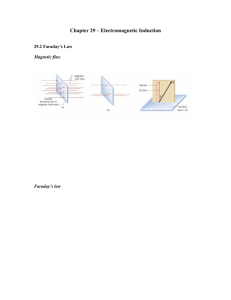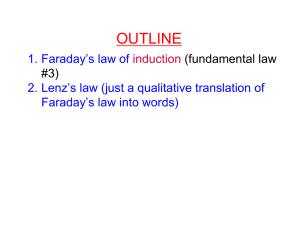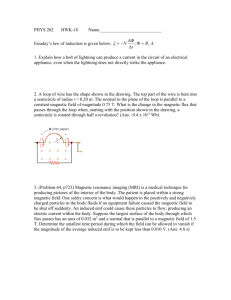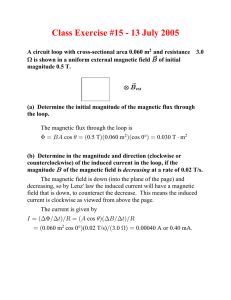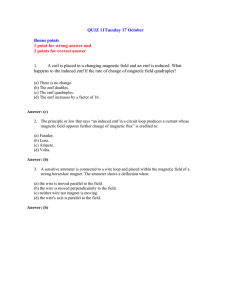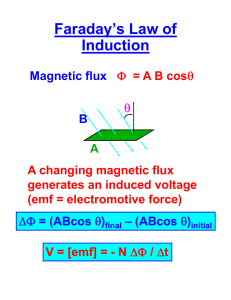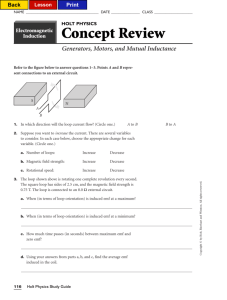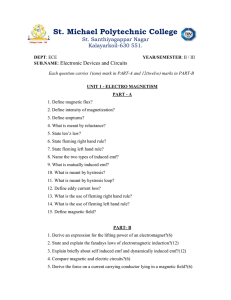Chapter-29 Slides
advertisement
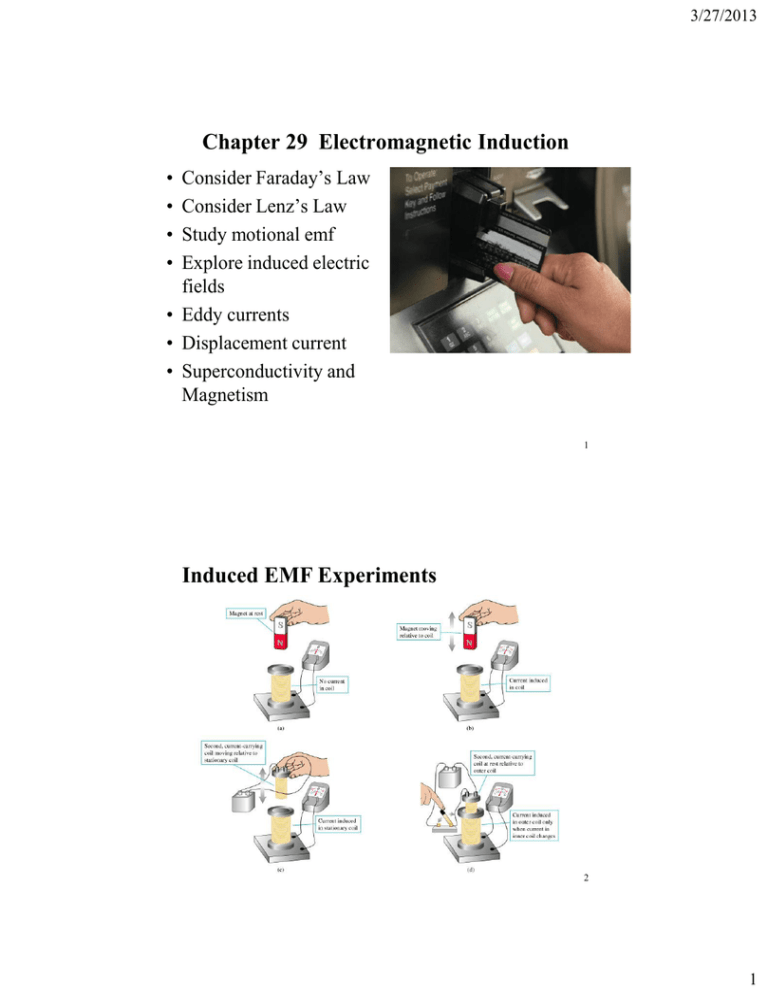
3/27/2013 Chapter 29 Electromagnetic Induction • • • • Consider Faraday’s Law Consider Lenz’s Law Study motional emf Explore induced electric fields • Eddy currents • Displacement current • Superconductivity and Magnetism 1 Induced EMF Experiments 2 1 3/27/2013 Induced Current Phenomenon 3 Faraday’s Law of Induction The induced emf is proportional to the rate of change of magnetic flux , B ,through the coil. •B, the magnetic field can change with time. •A, the area can change with time 4 2 3/27/2013 Faraday’s Law Area and Magnetic Flux Direction Regardless of what moves, knowing the magnetic flux around a conducting entity will allow determination of current induced. B B d A BdA cos For a uniform B field B Faraday’s Law of Induction B A BA cos d B dt 5 dB 0.020T / s dt A = 120 cm2 R (loop resistance) = 5 Determine induced voltage (VEMF = Vab). Determine induced current (I). Verify current direction using Lenz’s Law. 6 3 3/27/2013 7 Lenz’s Law •The direction of any magnetic induction effect is such as to oppose the cause of the effect. •The “cause” can be a change flux, or the motion of a conductor. •In all cases the induced current tries to prevent the status quo by opposing motion or change of flux. •The induced current due to the change in B is clockwise as seen from above the loop. (RHR opposite direction of fingers) •The Binduced that it caused is downward, opposite the change in the upward field B. 8 4 3/27/2013 Lenz’s Law I – Counter clockwise induced current 9 Lenz’s Law II – clockwise induced current 10 5 3/27/2013 Changing the Coil Shape Change the shape of the coil and you change the shape of the magnetic flux. The rate at which you change the shape is the rate of change of the magnetic flux This induces a current in the coil to oppose the change in flux. 11 A Simple Alternator (generator) = t, where is the angular velocity of the loop. B BA cos BA cos t (B is the total magnetic flux penetrating area A ) d B Vab BA sin t dt d B NBA sin t For an N-turn coil, Vab N dt 12 6 3/27/2013 DC generator • A dc generator produces an emf of the same sign (only positive) • Slip rings and brushes reverses the polarity negative of the negative cycle • Commercial dc generators have a large number of coils and commutator segments-smoothes out the emf approaching a constant dc Vab N dB N BA sin t dt 13 Motor average back emf • The motor’s back emf is the emf induced by the changing magnetic flux through the rotating coil. Vab N dB N BA sin t dt Back emf proportional to motor speed Slow speed could burn out motor 14 7 3/27/2013 Motional Electromotive Force •As the rod moves the magnetic field causes positive free charge to go to move to one end and negative charge to the other. •Equilibrium is established when the magnetic force equals the electric force. B E FB q(v xB) At equilibrium qE qvB sin E vBsin FE FB FB qvB sin FE qE FE qE for = 90° Vab EL vBL (29.6) 15 A conducting rod moving in a uniform magnetic field dA dA Lvdt B B dA B cos dA cos 1 d B B cos dA BdA d B BdA BLvdt d B BLv VEMF dt Figure 29-10 Faraday’s Law of Induction The induced emf () in a closed loop equals the negative of the time rate of change of magnetic flux through the loop. 16 8 3/27/2013 Eddy currents • Induced currents produce eddy currents that oppose the induced currents (and the motion of the disk) 17 Displacement current and Maxwell’s equations • A varying electric field will give rise to a magnetic field. • Explains electromagnetic waves. Displacement current iD between plates Proof of iD is the measure magnetic field between plates 18 9 3/27/2013 Superconductivity and the Meissner effect • When cooled below the critical temperature, superconductive materials lose all resistance to electrical current. • Refer to Figures 29.24 and 29.25 at right. 19 20 10 3/27/2013 21 22 11 3/27/2013 23 Q29.1 A circular loop of wire is in a region of spatially uniform magnetic field. The magnetic field is directed into the plane of the figure. If the magnetic field magnitude is constant, A. the induced emf is clockwise. B. the induced emf is counterclockwise. C. the induced emf is zero. D. The answer depends on the strength of the field. 12 3/27/2013 Q29.2 A circular loop of wire is in a region of spatially uniform magnetic field. The magnetic field is directed into the plane of the figure. If the magnetic field magnitude is decreasing, A. the induced emf is clockwise. B. the induced emf is counterclockwise. C. the induced emf is zero. D. The answer depends on the strength of the field. Q29.3 A circular loop of wire is placed next to a long straight wire. The current I in the long straight wire is increasing. What current does this induce in the circular loop? A. a clockwise current B. a counterclockwise current C. zero current D. not enough information given to decide 13 3/27/2013 Q29.4 A flexible loop of wire lies in a uniform magnetic field of magnitude B directed into the plane of the picture. The loop is pulled as shown, reducing its area. The induced current A. flows downward through resistor R and is proportional to B. B. flows upward through resistor R and is proportional to B. C. flows downward through resistor R and is proportional to B2. D. flows upward through resistor R and is proportional to B2. E. none of the above Q29.5 The rectangular loop of wire is being moved to the right at constant velocity. A constant current I flows in the long straight wire in the direction shown. The current induced in the loop is A. clockwise and proportional to I. B. counterclockwise and proportional to I. C. clockwise and proportional to I2. D. counterclockwise and proportional to I2. E. zero. 14 3/27/2013 Q29.6 The loop of wire is being moved to the right at constant velocity. A constant current I flows in the long straight wire in the direction shown. The current induced in the loop is A. clockwise and proportional to I. B. counterclockwise and proportional to I. C. clockwise and proportional to I2. D. counterclockwise and proportional to I2. E. zero. Q29.7 The rectangular loop of wire is being moved to the right at constant velocity. A constant current I flows in the long wire in the direction shown. What are the directions of the magnetic forces on the left-hand (L) and right-hand (R) sides of the loop? A. L: to the left; R: to the left B. L: to the left; R: to the right C. L: to the right; R: to the left D. L: to the right; R: to the right 15 3/27/2013 Q29.8 The drawing shows the uniform magnetic field inside a long, straight solenoid. The field is directed into the plane of the drawing, and is increasing. What is the direction of the electric force on a positive point charge placed at point a? A. to the left B. to the right C. straight up D. straight down E. misleading question — the electric force at this point is zero Q29.9 The drawing shows the uniform magnetic field inside a long, straight solenoid. The field is directed into the plane of the drawing, and is increasing. What is the direction of the electric force on a positive point charge placed at point b? A. to the left B. to the right C. straight up D. straight down E. misleading question — the electric force at this point is zero 16
